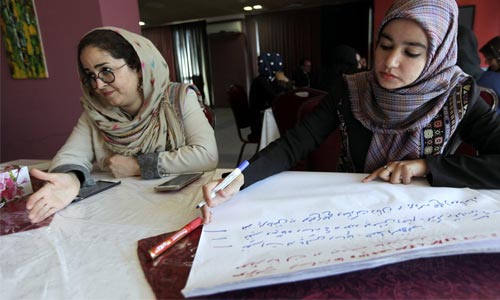The recent developments and peace talks to end the war in Afghanistan have made Afghans optimistic about the future. After years of failure in gathering all sides of the conflicts around one table, Moscow talks is considered a significant improvement towards peace. But the fact that this process has been male dominant, where women are only given a symbolic role, is a major concern for women and human rights activists.
Afghan women had been victims of political choices of different politicians and regimes throughout the history. They were used as a weapon during wars or were treated as subordinate human beings, who were unable to decide for themselves. Every political group and movement had their own definition of women’s rights and their role in the society, but the roots of all these definitions were based on the notion of patriarchy. Afghan women certainly suffered in different forms during last four decades of domestic conflicts in the country. With the inception of Taliban regime in 1996, however, the already unstable situation of Afghan women entered a new era, where women were increasingly treated more barbarously and inhumanly. The five years of Taliban regime in Afghanistan left unpleasant memories in every Afghan women’s mind. From being completely confined to home, now women were entirely excluded from the society and were not allowed to leave the house without a male companion. With the intervention of international community and the administration of the new interim government, many important actions have been taken to ensure humane and quality life for Afghan women. Nevertheless, even after 18 years of advocacy and implementation of projects worth millions, Afghanistan is still among the worst places for women. But this does not mean there were no improvements in women’s status in the country. In fact, women are unprecedently more involved in the society and government than any other period in the history.
The beginning of peace talks in the country has raised concerns that the freedom of women will be bargained in the process of peace negotiations with the Taliban as the whole process is male dominant and women have been sidelined. While, women are one of the main topics of the negotiation, they didn’t have voice in the negotiations that took place in Moscow. Women, a group that makes half of the population demographic, have the right to be engaged in any process that involves issues regarding Afghanistan, and participation in peace process is the legal right of women even if they were not victims of the Taliban regime. The symbolic participation of only two women in Moscow peace talks with more than 40 males is not only negation of women rights but questioning the transparency and inclusiveness of the whole process. In addition, it was expected that the two female delegations, who were participating on behalf of Afghan women, would talk and advocate not only for Afghan women but for the whole nation rather than just listening and then reporting the talks to media. This type of participation itself is underestimation of women’s role and such symbolic movements do not really imply involvement of women in the process.
The United Nation’s Peace Security Council resolution (1325) formally has acknowledged that civilians, especially women continue being excluded from security and peace negotiations, while they are the ones impacted the most by armed conflicts. The resolution affirms that peace and security negotiations tend to be more successful and last longer when women are included in the process. On the other hand, the United States Institute of Peace report reveals that Afghan women have successfully managed negotiation with the local Taliban leaders. There have been stories where local women in provinces as Kandahar, Baghlan and Paktia negotiated girl’s education and release of hostages in their community, which is indicating that local women know how to negotiate. Inclusion of local women’s voice and their suggestions in current peace talks will not only support and strengthen the negotiations from civilians’ side, but it will also give the sense of ownership to women, that they were able to decide for themselves and their future.
Therefore, women’s participation in peace negotiations should go beyond quotas and representation. What matters the most is their meaningful and active participation in the process. Meaningful participation means that women are present during negations and their experiences, concerns and suggestions are being considered for the resolution of the conflict. By one account, representation of women which is for the sake of numerical presence can be a good gesture towards women but it by all mean is not meaningful and empowered representation. That is to say, Afghan women’s presence in the current peace talks is more of quota-based representation rather than a meaningful representation, where women could bring their own voices and the voices of those who they are representing.
Even so, the majority of Afghan society believe that politics, issues of security and conflict resolution are ‘men-related’ topics and need higher level of analysis and understanding, which women lack. However, there is this famous saying that “rights are taken, not given”; if not all women, at least those that are involved in peace process, should use the opportunity and make their participation meaningful and bring women’s voice to the table.
Home » Opinion » Do Afghan Women have Meaningful Participation in Peace Negotiations?
Do Afghan Women have Meaningful Participation in Peace Negotiations?
| Neela Hassan

